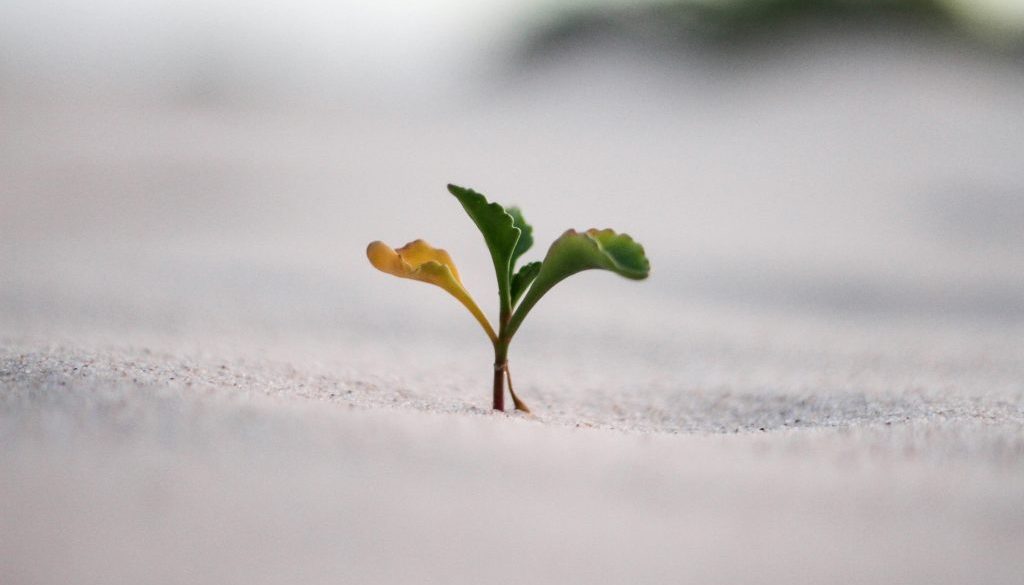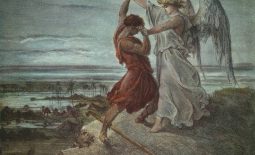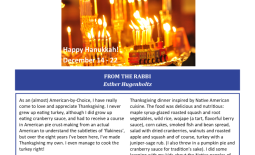Growth
Moses is tired. It’s not due to his age – he is still vigorous, his eyes still undimmed. He is weary, exhausted, depleted on account of holding it all. The battles, the conflicts and arguments, the divisions and delusions. He just wants to make it to the finish line, but every time he feels close to, well, closure, the future dissolves in front of his eyes, like a wadi’s mirage.
All of us are tired. It seems strange to say this at a time of summer, rest and relaxation. I am certainly physically well-rested, a tiny bit more tanned and very happy to be back with my congregation. But like Moses’ exhaustion, this exhaustion isn’t about rest or work. It is an existential weariness, the tension we feel in our chests of waiting to exhale for twenty-two months.
We want this awful, disastrous, destructive war to end. We want to see the hostages released and the people of Gaza fed. We want to imagine the seemingly impossible: Israel safe, Gaza rebuilt, the West Bank left in peace; both peoples, each under their fig tree and vine. Freeing the captive, feeding the hungry, healing the sick, making peace between a human being and their fellow: these are some of the most cardinal and elemental mitzvot of our tradition; the sacred bonds of responsibility and care that bind humanity to its own humanity.
And yet, we face a deepening, worsening crisis; starvation, displacement, the destruction of a society—a moral catastrophe that tests the mettle of our own souls and that tasks our Judaism with serious, urgent and committed introspection. It feels both heavy and appropriate that in the Jewish tradition, ‘summer’ is not associated with beautiful, sparkling days, with restful joy and play, but with the darkest moments during this brightest part of the year. This Shabbat stands on the threshold of Tisha b’Av, where we hold, each year, the brokenness of our world and the pain of our history. This year, we will hold even more. And our arms are already full of burdens and our eyes full of tears.
In this week’s portion, Moses reflects on his own legacy, a type of summary of his own life and achievements, as the Israelites are about to cross into the Promised Land. ‘Ha’aretz tovah’, the good land, the Torah describes it, and this description feels like both a mockery and a dream. Moses is tired, his heart aches, but through it all, he grasps glimmers of a future. He needs closure, and he also needs a way through. ‘How can I bear unaided the trouble of you, and the burden, and the bickering!’ Moses exclaims. ‘Eichah eseh levadi tar’chachem u’masachem v’riv’chem?’
‘Eicha’ – ‘how’… just like the opening words of the Book of Lamentations, named Eichah, which we will solemnly read on Saturday night.
The answer follows in the support and leadership of his community. The task before them is vast, but each of them takes a small amount of responsibility; they lighten the load of his hands and heart. We lighten each other’s load.
Closure and a way through. That is what we need too. The community that Moses led was also internally diverse; sometimes in brave conversation, other times in cutting conflict. The divisions were real and enduring, as are ours today. The way through is to set aside litmus tests and political agendas, and to slowly, gradually and honestly do the sacred work of reckoning with the moment we are living through. With grit and grace, with appropriate rebuke but always with immense compassion. ‘Be hard on systems, be soft on people’ is a wise adage. The only way through is to talk much and listen more, to learn and un-learn and re-learn and remain curious about each other. The land is beautiful and good; the actual land in Israel and Palestine, yes, even as it lays bleeding and scarred. But also our inner lands; our worlds where we till fertile soils and grow new ways of imaging healing and peace. This is the work we must do.
We will continue to do it. Together. As a holy community. We will honor each other’s bonds and attachments. We will not compromise each other’s humanity and story.
By the time, Parashat Devarim concludes, our weary Moses seems to have rediscovered his bearing and calling. ‘Lo tira’um’, he exhorts us, ‘do not be afraid’. Fear closes doors but courage can open them again. As we enter this season of repentance, this new Book of the Torah, the threshold of Tisha b’Av, in this world that is dangerous and dehumanizing, let us hold onto our courage and our love. We can grow in so many ways.




